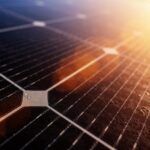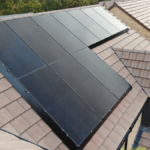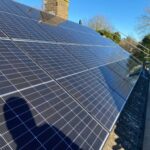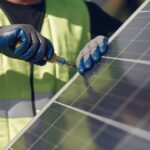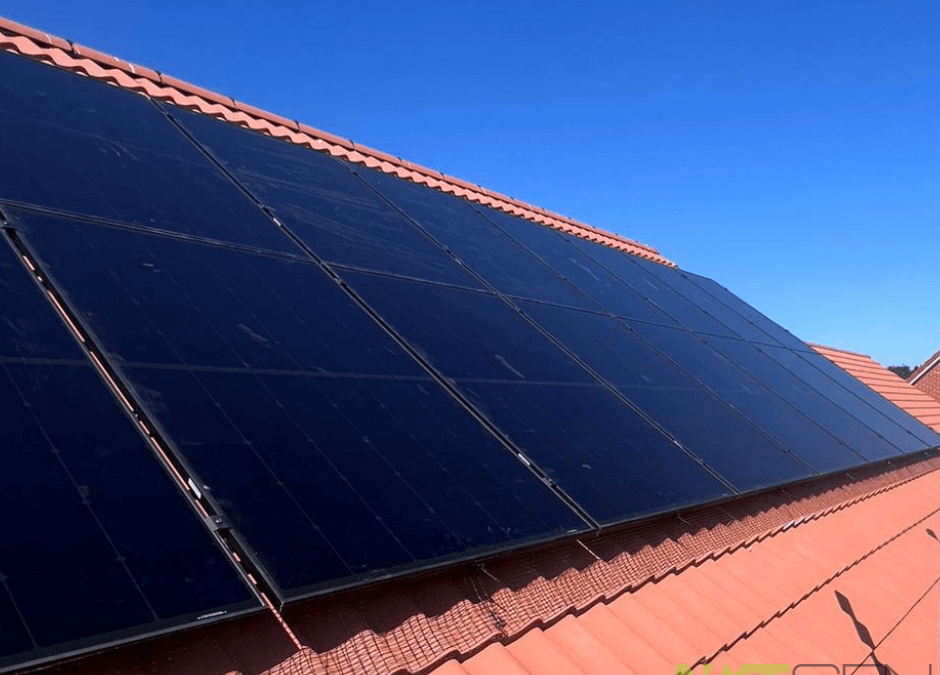


Solar panels are a great way to save money on your energy bills, reduce your carbon footprint, and increase the value of your home. But how much do you really know about solar panels? Do you have questions or doubts about how they work, how safe they are, or how suitable they are for the UK weather?
If you do, you’re not alone. Many people have questions about solar panels, and some may even have misconceptions or myths that prevent them from going solar. That’s why we’ve created this guide to answer some of the most frequently asked questions about solar panels, and to help you make an informed decision about whether solar is right for you.
If you have a question that is not covered in this guide, feel free to email us at robert@nxtgen.ltd and we’ll be happy to answer it for you.
Is a solar panel installation dangerous?
Installing solar panels involves working at heights and dealing with high voltage direct current (DC), which can pose some risks if not done properly. Faulty wiring and low-quality installations can lead to electrical faults and even fire hazards, which is why it’s crucial to choose a competent and qualified solar panel installer.
At NXTGEN Energy, we are MCS Certified (Solar PV and Battery Storage Certificates), NAPIT and TrustMark approved installers, with years of experience in the industry, and we are considered one of the best solar panel companies in the UK. When you choose us for your solar panel installation, you can rest assured that you are choosing an installer you can trust with a 5-Star Google Review rating and an ‘Excellent’ rating on Trustpilot.
Can solar panels overheat?
Solar panels are designed to operate under high temperatures, but they can also overheat under certain conditions. Excessive heat can have negative effects on the performance and efficiency of a solar panel, as well as its lifespan and durability. Overheating can lead to a decrease in power output, reduced lifespan, and potential damage to the panel itself.
Fortunately, the UK weather is rarely extreme, and it is very suitable for solar panels. However, to prevent overheating, it is important to ensure proper installation, regular maintenance, and adequate airflow around the solar panels.
Can solar panels power a home in the UK?
Not completely. Solar panels can power a large percentage of the energy requirements for a house in the UK. In fact, according to the latest MCS data, there are roughly 1.2 million UK homes as of 2023 using solar energy to power their homes. With a solar panel-only installation, you can expect your system to cater to up to 70% of your energy requirements. And by installing solar battery storage, a solar PV system can power up to 90% of your household’s demand.
Of course, not every home and roof is suitable for solar panels, and each home’s energy requirements are unique. That’s why it’s important to consult with a qualified and MCS Certified solar panel installer, who can assess your property and calculate the potential electricity generation for your solar PV system.
Can solar panels work at night?
Solar panels work by converting sunlight into electricity through the photovoltaic effect. This means that they can only generate electricity during the day, when sunlight is available. Solar panels do work in the winter, and on cloudy days where sunlight is limited, but they cannot work at night when there is no sunlight at all.
So how can you use solar energy at night? There are two options: grid-connected systems or battery storage solutions. A grid-connected system allows you to use electricity from the National Grid at night or during periods of low sunlight, while also exporting any excess electricity you generate back to the grid for credits or payments via the Smart Export Guarantee (SEG) scheme. A battery storage solution allows you to store the electricity you generate from your solar panels in solar batteries that is wired directly into your solar panel system. This way, you can use your own solar energy at night or whenever you need it. Remember we are MCS Certified Battery Storage installers, who can install your solar batteries to the high standards as required by MCS Certification.
Are solar panels self-cleaning?
Solar panels are not completely self-cleaning, but they do have some self-cleaning properties. Solar panels are made from self-cleaning glass, which means that they have a special coating that makes them resistant to dust, dirt, and debris. This coating also helps the rainwater to slide off the surface of the panels, washing away some of the accumulated dirt.
However, self-cleaning glass is not perfect. In dry and dusty environments, rainwater may not be enough to keep the solar panels clean. Also, if the panels are installed at a low angle, the water may not drain properly, leaving behind stains or spots. That’s why regular cleaning is always recommended to ensure your solar panel system reaches optimal performance.
Will solar panels become more efficient?
Solar panel technology has been improving rapidly over the years, and there is ongoing research and development aimed at increasing panel efficiency. Panel efficiency is the measure of how much sunlight a solar panel can convert into electricity. Currently, most residential solar panels have an efficiency of around 15-22%, with the most premium ones reaching around 22%. This means that for every 100 watts of sunlight that hits the solar panel, it can produce 15-22 watts of electricity.
This may not sound very impressive, but it is actually quite remarkable considering where we were 10 years ago. Solar panels are becoming more efficient and more powerful every year. According to Elon Musk (Tesla / X), we can expect solar panel efficiency to reach a maximum of around 30%, but not much more than that due to physical limitations. However, with constant innovation and creativity, who knows what the future of solar will look like?
Will solar panels work in a power cut?
This depends on what kind of solar panel system you have. If you have a grid-tied system, which means that your solar panels are connected to the National Grid, then your solar panels will not work in a power cut. This is a safety feature designed to protect the National Grid engineers who may be working on the lines during an outage. If your solar panels were still generating electricity, they could pose a risk of electrocution to the engineers.
However, if you have an off-grid or a hybrid system, which means that you have a battery or a generator that can store or produce electricity independently from the National Grid, then your solar panels can still work in a power cut. You can use the electricity stored in your battery or generated by your generator to power your essential appliances during a power outage.
If you want to have backup power during a power cut, it’s important to discuss this with your solar installer. They can help you choose the best option for your needs and budget. One option is to install an Emergency Power Supply (EPS), which allows your solar panel system to provide backup power and help you maintain essential loads during an outage. This is a perfect solution for homeowners who suffer from frequent power cuts or who live in rural areas.
Can you install solar panels without a smart meter?
Yes, you can install solar panels without a smart meter. A smart meter is a device that measures and records your electricity consumption and how much electricity you are importing from or exporting to the National Grid. Smart meters can help you monitor your energy usage and save money on your energy bills.
However, you don’t need a smart meter to install solar panels. You can still use a traditional meter or an export meter to measure your electricity consumption and generation. However, if you want to access off-peak or Economy 7 energy tariffs to charge your batteries or electric vehicles at cheaper rates, or if you want to get rewarded for your exported energy, then you do need a smart meter or at least a dual-meter that can record import and export data at half-hourly rates.
If you are interested in getting a smart meter or a dual-meter, you can contact your energy supplier or your solar installer to arrange it for you.
Can you install solar panels without an MCS certificate?
Yes, you can install solar panels without an MCS certificate, but you won’t be able to benefit from the Smart Export Guarantee (SEG) payments. The Smart Export Guarantee is a scheme that pays you for the excess electricity that you generate from your solar panels and export back to the National Grid. To qualify for this scheme, you must have an MCS certificate, which proves that your solar panel system meets the quality and safety standards set by the Microgeneration Certification Scheme (MCS).
Only MCS approved installers, like ourselves, we are MCS Certified for both Solar PV installations and Battery Storage installations, can provide you with an MCS certificate. As an MCS Certified solar PV (panel) installer, we guarantee that your solar panel installation will only consist of MCS approved products, and will be installed according to MCS standards.
So can you install solar panels without an MCS certificate?
Yes, but will you receive the full benefits of installing a solar panel system? No. An MCS certificate is a mark of quality, competence, and compliance that ensures your solar PV system is safe and reliable.
Do solar panels affect your home insurance?
Solar panels do not affect your home insurance, as they are covered as part of your building insurance. However, every insurer needs to be informed of any major work being undertaken at your property, and installing solar panels is no different. As installing solar panels is classified as building works, you should provide your insurance 30 days’ notice prior to your installation. Whilst every insurer is different, in most instances solar panels do not impact your premium. Some insurers may want to check your installer’s public liability insurance or receive a copy of the MCS certification after the installation is complete.
At NXTGEN Energy, we recommend contacting your home insurer prior to solar panel installation for peace of mind, and to get in writing verification of any changes to the terms and conditions of your home insurance.
Do solar panel companies own your roof?
Solar panel companies do not own your roof in any way. This is a common myth that stems from the previous Feed In Tariff (FIT) scheme, where there were some instances where the owner of the property and the owner of the solar panels were different. This was called the “Rent-a-roof” model, where a third-party company would install solar panels on your roof for free, and then collect the export payments from the FIT scheme. You would only benefit from a reduced energy bill, but not from any payments or incentives.
The FIT scheme has since been replaced by the Smart Export Guarantee (SEG) scheme, in which this type of third-party ownership no longer exists. When you install solar panels with us, you own both the property and the solar panels. You can benefit from both a reduced energy bill and export payments to the National Grid from the Smart Export Guarantee scheme.
Do solar panel companies replace your roof?
Solar panel companies typically do not replace your roof in order to install solar panels. However, they do need to assess if your roof is structurally sound and suitable for solar panels. Before installing solar panels, our renewable energy experts will conduct a survey of your roof and perform weight and wind load calculations. If your roof appears poorly maintained or damaged, we will advise you to address any necessary repairs or replacements with a roofing contractor (NXTGEN Futures can help with this on 0800 270 7717) before installing solar panels. This ensures the longevity and effectiveness of your solar panel system and ensures your property will remain safe.
Can solar panels power a hot tub?
Solar panels can power many things, from electric cars to electric heaters, and yes even hot tubs. Basically anything that requires electricity! However, hot tubs do consume large amounts of electricity and draw on a high load of power. Solar panels alone may not be enough to power a hot tub efficiently.
To use solar energy to power a hot tub, you need to have a high-voltage battery and an off-peak charging system. A high-voltage battery can store the electricity generated by your solar panels during the day and use it to power your hot tub at night or whenever you need it. An off-peak charging system can allow you to charge your battery at cheaper rates (force charging) during off-peak hours like Economy 7 tariffs, when the demand for electricity is low.
If you are interested in using solar energy to power a hot tub, you need to discuss this with your solar installer. They can help you choose the best battery and charging system for your needs and budget.
How can I get solar panels?
With the current energy and climate crisis, another frequently asked question about solar panels our team gets asked is how can I get solar panels installed. Now more than ever is the perfect time to start generating your own renewable energy by installing solar panels.
Frequently Asked Questions about Solar Panels
Latest Solar Panel Posts
- Solar Panels: Pros, Cons, and Whether They’re Worth ItSolar panels can cut your energy bills by up to 70%, and surplus electricity can be sold back to the National Grid through the Smart Export Guarantee (SEG) Scheme. They reduce your carbon footprint, require minimal maintenance, and can last over 30 years, making them a long-term eco-friendly investment. Upfront costs are… Read more: Solar Panels: Pros, Cons, and Whether They’re Worth It
- UK Schools and Hospitals to Receive £180 Million Solar InvestmentSolar Investment: The UK government, through Great British Energy, is investing £180 million to install solar panels on 200 schools and 200 hospitals as part of its net-zero carbon strategy. Benefits: This initiative aims to cut energy costs, reduce carbon emissions, and enhance energy security by reducing reliance on imported fossil fuels. … Read more: UK Schools and Hospitals to Receive £180 Million Solar Investment
- Understanding Solar Panel EfficiencySolar panels convert sunlight to electricity through photovoltaic cells, storing extra energy for later use. There are three main types of solar panels: monocrystalline, polycrystalline, and thin-film. Monocrystalline panels lead in efficiency (20%+), but new technologies are improving performance continuously. Solar panels save money, boost property value & reduce environmental impact,… Read more: Understanding Solar Panel Efficiency
- How SolaSkirt Can Protect Your Solar PanelsPigeon Issues: Pigeons under solar panels damage cables, leave guano, spread disease & create noise. SolaSkirt Fix: Aluminium barrier that blocks pigeons, enhances panel look, and installs without damage. Top Benefits: Durable, weatherproof, maintenance-free, and improves aesthetics & efficiency of panels. Cost-Saving: An affordable pigeon proofing solution that prevents expensive future… Read more: How SolaSkirt Can Protect Your Solar Panels
- Are Brits Turning Their Backs on Solar Panels?High upfront costs: Deter many Brits from installing solar panels despite falling prices & financing options. Myths debunked: Solar panels work in cloudy weather, need minimal maintenance & can last 25–30 years. Financial & Environmental benefits: Solar panels cut electricity bills by up to 70% & lower carbon footprints. Government support… Read more: Are Brits Turning Their Backs on Solar Panels?
- Choosing the Best Solar Panel System InstallerChoose MCS certified installers with Solar PV and Battery Storage Certificates for quality & incentives. Pick local installers familiar with Essex, Kent, and London’s weather and building regulations. Look for full-service solar installers from consultation to maintenance with MCS certification. NXTGEN Energy offers tailored solar panel systems for homeowners in Essex,… Read more: Choosing the Best Solar Panel System Installer
- Solar Panel System Maintenance in the UKRegular Maintenance: Ensures optimal performance, maximizes energy efficiency & prevents costly repairs. Common Issues in the UK: Dirt, debris, bird droppings & ice build-up require regular cleaning & inspections. Best Practices: Clean panels with soft cloth & water, monitor performance & schedule maintenance visits. Seasonal Tips: Spring cleaning, summer heat protection,… Read more: Solar Panel System Maintenance in the UK
- Are solar panels worth it? NXTGEN Energy’s guide to getting startedInstalling solar panels can significantly reduce electricity bills, with prices dropping in recent years. Solar panels are a good investment for those with the space, daytime electricity usage & a south-facing roof. Consider financing options carefully, as borrowing can be expensive; paying outright provides better returns. Solar batteries store energy for… Read more: Are solar panels worth it? NXTGEN Energy’s guide to getting started
- How Amazon is Preparing for the Energy Needs of the FutureAmazon has over 600 renewable energy projects globally, with 230+ in Europe. These efforts support Amazon’s goal of net-zero carbon emissions by 2040. Amazon remains the top global and European corporate renewable energy buyer for the fifth year. Key achievements include 46 new projects in Europe, doubling Japan’s capacity & 53 projects in India. Discover… Read more: How Amazon is Preparing for the Energy Needs of the Future
- How Solar Panels Are InstalledWhat you can expect from a solar panel installation Solar panel installations typically take about a day to complete, depending on the complexity of the system. Solar panel installations require scaffolding, fixing brackets, wiring, inverter & interconnection to the grid. Solar panel installations need to be done by MCS Certified installers, who… Read more: How Solar Panels Are Installed
- How Solar Panels Increase Property ValueSolar panels can boost your home’s value by an average of £2,000 & command a price premium of 0.9% to 2%. Homes with solar panels have better EPC ratings, which can increase property value by up to 14%. Eco-friendly homes are in high demand, making solar-powered homes more attractive to buyers. … Read more: How Solar Panels Increase Property Value
- Did You Know That Solar Costs Have Fallen by 82%?Solar panel costs have dropped by 82% since 2010, making solar energy more accessible for UK homeowners. Factors to consider before switching to solar include initial investment, energy savings, and roof suitability. Government incentives, such as the Smart Export Guarantee (SEG) scheme, can help offset the initial costs. NxtGen Energy offers… Read more: Did You Know That Solar Costs Have Fallen by 82%?


 Solar Panels 101: Everything You...
Solar Panels 101: Everything You...

